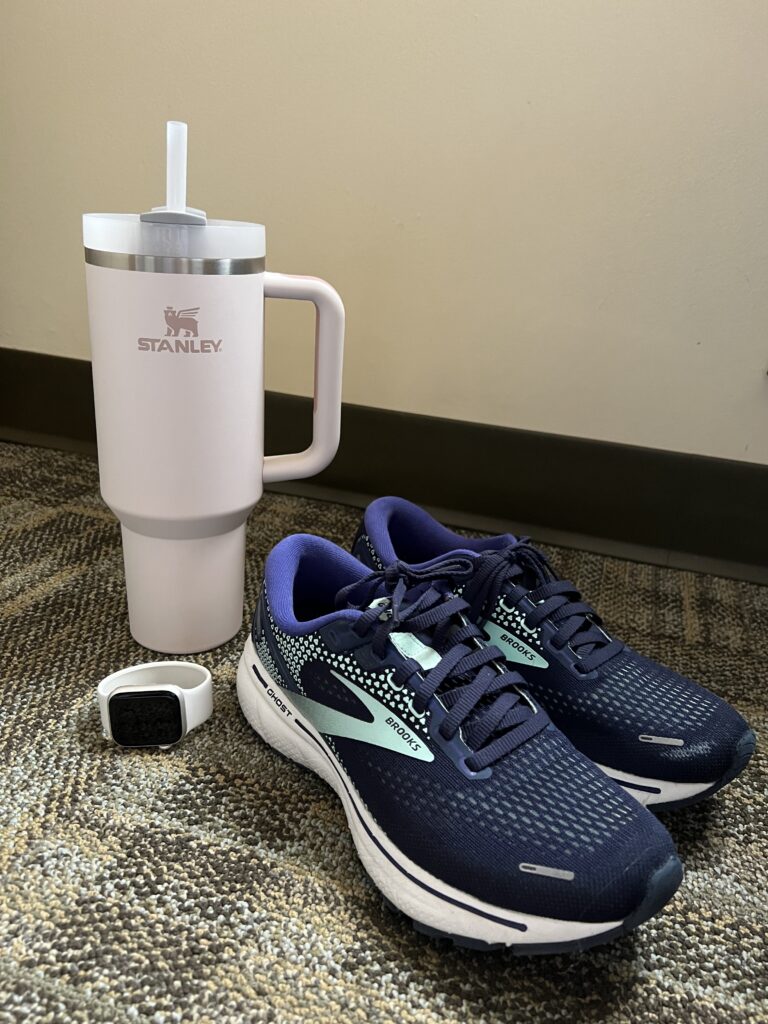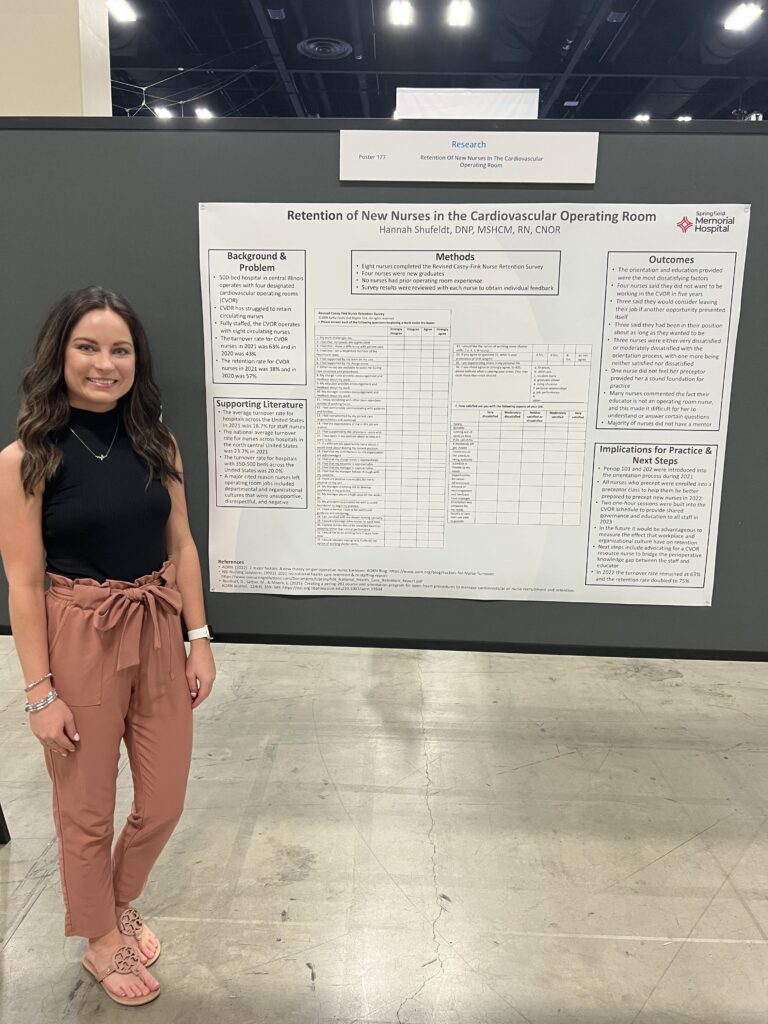 Hannah Shufeldt, DNP, MSHCM, RN, CNOR, is the first nursing leader to hold the inaugural New Nursing Graduate position on the ANA-Illinois Board of Directors. She is the nurse manager for the cardiovascular operating room in the Memorial Health System in Springfield, Illinois.
Hannah Shufeldt, DNP, MSHCM, RN, CNOR, is the first nursing leader to hold the inaugural New Nursing Graduate position on the ANA-Illinois Board of Directors. She is the nurse manager for the cardiovascular operating room in the Memorial Health System in Springfield, Illinois.
“Right now, I work in an operating room. I’m the manager, and I have a lot of new grad nurses,” she says. “So I’ve spent a lot of time working closely with them to help them succeed in this environment.”
She works closely with new nurses in her area and was inspired to run for the board based on her passion for advocating for new nurses.
“I really enjoy being able to advocate and be the voice for them. I wanted to get involved and do that same thing but at a larger level outside of the hospital,” she says.
Impacts of the Pandemic
With the Covid pandemic reducing some of the clinical experiences available to new nurses, Hannah sees how that affects both experienced and new nurses.
“The experienced nurses are wonderful. They have that clinical background, that solid foundation. Their schooling probably looked a lot different from what schooling looks like now, or even when I went to nursing school four to five years ago.
“With the Covid pandemic, it’s all changed. Nurses don’t get near as much hands-on experience in clinicals, which is really unfortunate I think.”
Nurses who start their first jobs with less hands-on experience impacts experienced nurses as well.
“We’re really relying on those experienced nurses with that background to more-so teach than what they’re used to. Nurses have more patients. They don’t have as much time to teach probably, and they’re slowing themselves down to teach new graduate nurses more so than they were four or five years ago.”
Regardless, welcoming new grads—and investing in their training—is crucial.
“If we don’t take new grads in our area, we’re never going to be able to function as a department,” she says.
Tips for Effective Training
It’s not easy for an experienced nurse to slow down and teach a new nurse, and it’s not easy for new nurses to enter fast-paced environments and learn important skills. But it’s crucial for both groups, and Hannah has advice for how they can successfully teach—and learn—in the current nursing environment.
For experienced nurses, she tells them to slow down and not assume that a new nurse has mastered an essential skill yet. Being kind, friendly, and patient makes all the difference to new nurses who may be struggling or overwhelmed.
“It takes someone with experience just taking that step back and taking time to work with that nurse and saying ‘Hey, tell me what you HAVE done. What do you feel comfortable with? What do you need to work on, and how can we meet together to get you what you need? Help me teach you.’”
She also recommends the “See one, do one, teach one” method.
The conversation could go something like this: “Hey, have you put a foley in before? No? Ok, great, let’s go do this one together. We’ll do one together, and you watch me do it. Next time I’ll watch you do it. We’ll work together. Maybe on your third one, I’ll watch you do it completely independently.”
For new nurses, she understands that some may feel more timid about saying they haven’t done something before, so she recommends keeping a checklist, especially if they’re precepting with multiple people.
“Having a checklist to just keep track of what they’ve done and how many times they’ve done it. ‘Hey, I’ve put in two foleys. I’ve started four IVs.’ That preceptor should be able to look at that and say, ‘Oh, you’ve done five of these. You should be comfortable doing it by yourself, but I understand you still might not be proficient yet.”
Effectively working together is the best way to get new nurses up to speed and the experienced nurses the teammates they’re looking for.
Must-Haves for New Nurses
 Along with a checklist and a willingness to speak up about what they need more practice doing, Hannah has a few other practical suggestions for new nurses.
Along with a checklist and a willingness to speak up about what they need more practice doing, Hannah has a few other practical suggestions for new nurses.
“Shoes are very important!” she says.
She recommends keeping two pairs of shoes when working in the operating room: a comfortable pair of tennis shoes and a pair of rubber shoes that can be easily washed off.
A smart watch is also helpful.
“I loved using my timer on my phone because I could see the minutes and the seconds. That was always really helpful to look at.”
Attracting Nurses to the Profession
The nursing shortage isn’t going to be solved overnight, but Hannah believes social media could at times be scaring potential nurses away from the profession.
“I feel like there’s so much negative stuff out there, and it’s realistic, unfortunately, but that’s not how we’re going to attract people to nursing,” she says.
“I think it’s important to get positive posts out there. Share the good stories. Share the time when the family was so thankful for that floor nurse who spent the last day of someone’s life with them or really went above and beyond. That way, we’re getting the positive out there, and people are like ‘Oh, I want to do that. I want to get that satisfaction for myself.’”
Not surprisingly, she’s hopeful about the future of nursing and wants others to see all the opportunities in the profession.
“There’s so many routes you can go into. There’s hospital nursing. There’s clinic nursing. There’s work from home jobs. There’s telehealth. You can always find something you like, I think, and it gives you the option. You’re not set in staying in a certain area because you can literally go any town, any state, any country, and find a job, which I think is something not every profession offers.”

